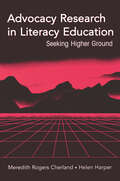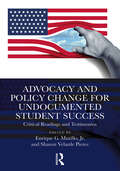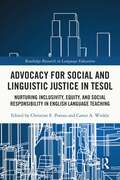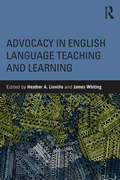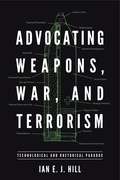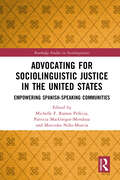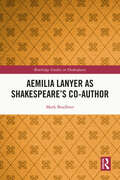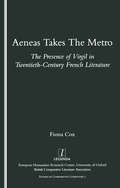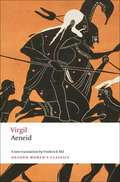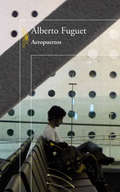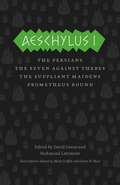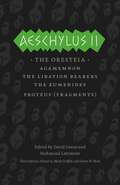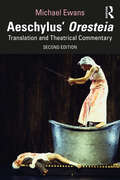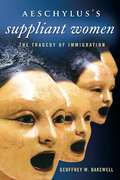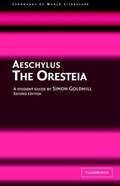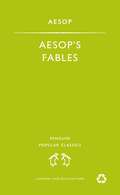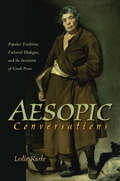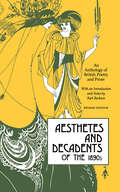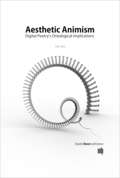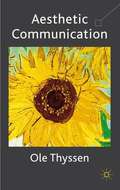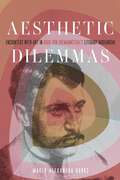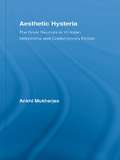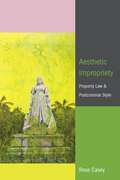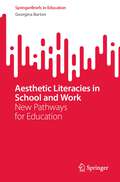- Table View
- List View
Advocacy Research in Literacy Education: Seeking Higher Ground
by Helen Harper Meredith Rogers CherlandThis book reviews what the authors term advocacy research in literacy education-research that explicitly addresses issues of social justice, equity, and democracy with the distinct purpose of social transformation. It surveys what educational researchers who are working for social justice have accomplished, describes current challenges, and outlines future possibilities. The first section maps the terrain of advocacy research in literacy education. The authors group this large and expanding body of research into four categories: Critical Literacy(ies); Radical Counternarratives in Literacy Research; Literacy as Social Practice; and Linguistic Studies. Each chapter describes the research area, traces its history, provides example studies, and assesses the contributions of research to advocacy work now and potentially in the future. The second section provides a deeper consideration of challenges to the field of advocacy research and suggests future directions for research and scholarship; this section reflects the need to complicate and trouble the terms and relations between and among social justice, ethics, democracy, freedom, and literacy. As a whole, this book is a response to the current popular understandings of literacy education that limit the efficacy of advocacy work in these troubled times-understandings that support the proliferation of standardized testing, teacher testing, and scripted lessons and programs, along with the privileging of particular forms of research. Intended for those who work or soon will work in literacy education-students, teacher educators, researchers, and practitioners-this book represents the authors' belief that it is time for advocacy workers to strengthen and intensify their efforts to promote the most principled, effective literacy education for democratic life. It is their hope that this book will contribute to such an effort.
Advocacy and Policy Change for Undocumented Student Success: Critical Readings and Testimonios
by Enrique G. Murillo Sharon Velarde PierceAdvocacy and Policy Change for Undocumented Student Success is a compelling exploration of the undocumented student experience in America, offering a deep dive into the advocacy, education, and systemic challenges faced by undocumented communities.Compiling the most significant work in the field in terms of its contributions to research and professional practice, this volume uncovers the historical struggles and triumphs of undocumented students and their families in their quest for educational access and equity. From pivotal legal milestones to personal narratives of resilience and adversity, this collection paints a comprehensive picture of the ongoing battle against legal and societal barriers. It delves into the mental health impacts of living undocumented and presents innovative strategies and policy reforms aimed at bridging the gap between harsh realities and hopeful aspirations. A clarion call to action, this volume is an invitation to join the fight for a more equitable and inclusive society, recognizing the vital contributions of undocumented individuals and advocating for systemic change.Advocacy and Policy Change for Undocumented Student Success is a must-have resource for graduate students and researchers in Educational Leadership and Policy, Multicultural Education, and Teacher Education. It will also be an important reading for educational leaders, teachers, counselors, administrators, and organizations that share a common interest in and commitment to the educational issues that impact undocumented students and their families.
Advocacy for Social and Linguistic Justice in TESOL: Nurturing Inclusivity, Equity, and Social Responsibility in English Language Teaching (Routledge Research in Language Education)
by Christine E. Poteau Carter A. WinkleRecognizing the need for increased social justice in the fields of TESOL and English Language Teaching (ELT) globally, this volume presents a range of international case studies and empirical research to demonstrate how English language instruction can promote social and linguistic justice through advocacy-oriented pedagogies and curricula. Advocacy for Social and Linguistic Justice in TESOL adopts a critical, and evidence-based approach to identifying effective practice in ensuring inclusive and equitable learning and teaching. Chapters address emergent issues including heritage language and L1 attrition, teacher and learner identity, and linguistic colonialism, as well as wider issues such as global citizenship and human rights. Focus is placed on empowering both educators and learners as advocates of social justice and consideration is also given to how social responsibility can be supported through enhanced teacher preparation and professional development. Making a timely contribution at the intersection of advocacy, social justice, and English language teaching, this book will be key reading for postgraduate researchers, scholars, and academics in the fields of TESOL and ELT, as well as language education, applied linguistics, and the sociology of education more broadly. English language teachers and practitioners will also find this volume of interest.
Advocacy in English Language Teaching and Learning
by Heather A. Linville James WhitingAppropriate for those new to the topic and established scholars, this holistic text examines the nexus of advocacy and English-language teaching, beginning with theories of advocacy, covering constraints and challenges in practice, and offering a range of hands-on perspectives in different contexts and with different populations. Bringing together wide-ranging and diverse viewpoints in TESOL, this volume examines the role of advocacy through a social justice lens in a range of contexts, including K-12 classrooms and schools, adult and higher education settings, families and communities, and teacher-education programs and professional organizations. Advocacy in English Language Teaching and Learning offers readers a deeper understanding of what advocacy is and can be, and gives teacher candidates and educators the tools to advocate for their students, their families and communities, and their profession.
Advocating Weapons, War, and Terrorism: Technological and Rhetorical Paradox (RSA Series in Transdisciplinary Rhetoric #9)
by Ian E. HillTechnē’s Paradox—a frequent theme in science fiction—is the commonplace belief that technology has both the potential to annihilate humanity and to preserve it. Advocating Weapons, War, and Terrorism looks at how this paradox applies to some of the most dangerous of technologies: population bombs, dynamite bombs, chemical weapons, nuclear weapons, and improvised explosive devices.Hill’s study analyzes the rhetoric used to promote such weapons in the nineteenth and twentieth centuries. By examining Thomas R. Malthus’s Essay on the Principle of Population, the courtroom address of accused Haymarket bomber August Spies, the army textbook Chemical Warfare by Major General Amos A. Fries and Clarence J. West, the life and letters of Manhattan Project physicist Leo Szilard, and the writings of Ted “Unabomber” Kaczynski, Hill shows how contemporary societies are equipped with abundant rhetorical means to describe and debate the extreme capacities of weapons to both destroy and protect. The book takes a middle-way approach between language and materialism that combines traditional rhetorical criticism of texts with analyses of the persuasive force of weapons themselves, as objects, irrespective of human intervention. Advocating Weapons, War, and Terrorism is the first study of its kind, revealing how the combination of weapons and rhetoric facilitated the magnitude of killing in the nineteenth and twentieth centuries, and illuminating how humanity understands and acts upon its propensity for violence. This book will be invaluable for scholars of rhetoric, scholars of science and technology, and the study of warfare.
Advocating for Sociolinguistic Justice in the United States: Empowering Spanish-speaking Communities (Routledge Studies in Sociolinguistics)
by Mercedes Niño-Murcia Pellicia, Michelle F. Ramos Patricia MacGregor-MendozaThis collection focuses on social awareness and critical language awareness with the goal of enlightening and empowering multilingual and multicultural communities across the U.S.Each chapter brings to light the trauma, gaps in services and misguided societal perceptions that adversely impact communities whose linguistic and cultural background and/or status as migrants place them in vulnerable situations. In doing so, the authors and editors demonstrate how an increased awareness of diverse communities’ linguistic and cultural wealth can be leveraged to build strength and resilience in order to overcome physical, verbal or symbolic violence and provide remedies for inequities in educational, medical, and legal contexts.Showcasing discussions of the intersectionality and contexts in which language, power, migration, and the cultural funds of knowledge of minoritized communities interact, this volume will be of interest to students, scholars, and educators in sociolinguistics, applied linguistics, and language education.
Aemilia Lanyer as Shakespeare’s Co-Author (Routledge Studies in Shakespeare)
by Mark BradbeerThis book presents original material which indicates that Aemilia Lanyer – female writer, feminist, and Shakespeare contemporary – is Shakespeare’s hidden and arguably most significant co-author. Once dismissed as the mere paramour of Shakespeare’s patron, Lord Hunsdon, she is demonstrated to be a most articulate forerunner of #MeToo fury. Building on previous research into the authorship of Shakespeare’s works, Bradbeer offers evidence in the form of three case studies which signal Aemilia’s collaboration with Shakespeare. The first case study matches the works of "George Wilkins" – who is currently credited as the co-author of the feminist Shakespeare play Pericles (1608) – with Aemilia Lanyer’s writing style, education, feminism and knowledge of Lord Hunsdon’s secret sexual life. The second case-study recognizes Titus Andronicus (1594), a play containing the characters Aemilius and Bassianus, to be a revision of the suppressed play Titus and Vespasian (1592), as authored by the unmarried pregnant Aemilia Bassano, as she then was. Lastly, it is argued that Shakespeare’s clowns, Bottom, Launce, Malvolio, Dromio, Dogberry, Jaques, and Moth, arise in her deeply personal war with the misogynist Thomas Nashe. Each case study reveals new aspects of Lanyer’s feminist activism and involvement in Shakespeare’s work, and allows for a deeper analysis and appreciation of the plays. This research will prove provocative to students and scholars of Shakespeare studies, English literature, literary history, and gender studies.
Aeneas Takes the Metro: The Presence of Virgil in Twentieth-century French Literature
by Fiona Cox"This study traces Virgil's journey through twentieth-century France by examining his profile in the works of Gide, Aragon, Valery, Pagnol, Klossowski, Butor, Simon and Pinget, and by looking at how their Virgilian appropriations complement and modify current readings of the ""Aeneid"" and other works. His presence in these works provides insights not only into modern French culture but into the Virgilian oeuvre itself. This process of mutual illumination is highlighted in Cox's argument by theories of intertextuality and dialogism. Although Virgil's presence in French literature is characterized by its focus on exile and uncertainty, Cox's study reaffirms the multivalency of this great European poet and his continuing relevance at the turn of the millennium."
Aeneid
by Frederick Ahl VirgilFrederick Ahl's new translation captures the excitement, poetic energy, and intellectual force of the original in a way that has never been done before. Ahl has used a version of Virgil's ancient hexameter, a swift-moving six-beat line varying between twelve and seventeen syllables, to reproduce the original poetry in a thrillingly accurate and engaging style. This is anAeneidthat the first-time reader can grasp and enjoy, and whose rendition of Virgil's subtleties of thought and language will enthrall those already familiar with the epic. Unlike most translators, Ahl has chosen to retain Virgil's word-play, the puns and anagrams and other instances of the poet's ebullient wit. "Like Shakespeare and the Greek tragedians, Virgil grasped that humor and earnestness are not mutually exclusive in art any more than they are in life. One should read theAeneidnot in solemn homage, but for enjoyment. " Enhanced by Elaine Fantham's Introduction, Ahl's comprehensive notes and an invaluable indexed glossary, this lively new translation brings readers closer to the original and the myriad enjoyments to be found there.
Aeropuertos
by Alberto FuguetUn relato donde la emoción dibuja el lado B de ser padres. En Aeropuertos importa el cómo por sobre el qué de las cosas. Cómo nos paramos ante el presente, vislumbramos el futuro, recuperamos lo que fue y cómo, finalmente, nos las arreglamos para vivir con los errores cometidos. Otras vidas, vidas que ella nunca tendría, pero que quizás habría tenido si todo hubiera sido diferente. ¿Sería más feliz? No lo sabe. Sí distinta, pero esa es otra cosa, así como esas vidas son otras vidas y esas vidas no tienen a Pablo, su hijo, se dice en voz baja Francisca, la protagonista de esta la última novela de Alberto Fuguet, un relato donde la emoción dibuja el lado B de ser padres. Álvaro escucha una y otra vez el casete de Radiohead, mientras Francisca está embarazada; ellos tienen sólo diecisiete años.
Aeschylus I: The Persians, The Seven Against Thebes, The Suppliant Maidens, Prometheus Bound (The Complete Greek Tragedies)
by AeschylusThe third edition of this volume includes newly revised, authoritative and compelling translations of four timeless works by the Ancient Greek tragedian.Aeschylus I contains “The Persians,” translated by Seth Benardete; “The Seven Against Thebes,” translated by David Grene; “The Suppliant Maidens,” translated by Seth Benardete; and “Prometheus Bound,” translated by David Grene. For this edition, Mark Griffith and Glenn W. Most have carefully updated these translations to bring them even closer to the ancient Greek while retaining the vibrancy for which the renowned University of Chicago Press series is famous. This edition also includes brand-new translations of Euripides’ Medea, The Children of Heracles, Andromache, and Iphigenia among the Taurians, fragments of lost plays by Aeschylus, and the surviving portion of Sophocles’s satyr-drama The Trackers. New introductions for each play offer essential information about its first production, plot, and reception in antiquity and beyond. In addition, each volume includes an introduction to the life and work of its tragedian, as well as notes addressing textual uncertainties and a glossary of names and places mentioned in the plays. The entire series has also been reorganized both within and between volumes to reflect the most up-to-date scholarship on the order in which the plays were originally written.
Aeschylus II: The Oresteia (The Complete Greek Tragedies)
by AeschylusThis updated translation of the Oresteia trilogy and fragments of the satyr play Proteus includes an extensive historical and critical introduction. In the third edition of The Complete Greek Tragedies, Mark Griffith and Glenn W. Most have carefully updated the translations to bring them even closer to the ancient Greek while retaining their vibrancy for which the Grene and Lattimore versions are famous. New introductions for each play offer essential information about its first production, plot, and reception in antiquity and beyond.Each volume also includes an introduction to the life and work of the tragedian and an explanation of how the plays were first staged, as well as notes addressing textual uncertainties and a glossary of names and places mentioned in the plays. The result is a series of lively and authoritative translations offering a comprehensive introduction to these foundational works of Western drama.
Aeschylus' Oresteia: Translation and Theatrical Commentary
by Michael EwansThis is a fully revised new edition of Michael Ewans’ 1995 English translation of the Oresteia, taking into account the extensive work published on the trilogy in recent years.Accompanying this lucid, accurate and actable translation is a substantial introduction, outlining the festival setting of the plays, the original performance conditions and performance style, the form and meaning of the trilogy, the issues surrounding the act of translation, and finally a survey of some major productions since 1980. The text itself is a thoroughly competitive translation into modern English verse, now significantly revised in the light of recent scholarship on the text. It is followed by a theatrical commentary on each scene and chorus, providing unique insights into how the plays might have been staged in ancient Athens and how they can be staged today. The book also includes notes on the translation, two glossaries of names and Greek terms, selected further reading, and a chronology of Aeschylus’ life and times.Aeschylus’ Oresteia: Translation and Theatrical Commentary is the most comprehensive English edition of Aeschylus’ masterpiece, and this new edition fully meets the needs of teachers, students and practitioners working on the trilogy as well as those interested in ancient Greek drama and literature more broadly.
Aeschylus's Suppliant Women
by Geoffrey W. BakewellThis book offers a provocative interpretation of a relatively neglected tragedy, Aeschylus's Suppliant Women. Although the play's subject is a venerable myth, it frames the flight of the daughters of Danaus from Egypt to Greece in starkly contemporary terms, emphasizing the encounter between newcomers and natives. Some scholars read Suppliant Women as modeling successful social integration, but Geoffrey W. Bakewell argues that the play demonstrates, above all, the difficulties and dangers noncitizens brought to the polis. Bakewell's approach is rigorously historical, situating Suppliant Women in the context of the unprecedented immigration that Athens experienced in the sixth and fifth centuries BCE. The flow of foreigners to Attika increased under the Pisistratids but became a flood following liberation, Cleisthenes, and the Persian Wars. As Athenians of the classical era became increasingly aware of their own collective identity, they sought to define themselves and exclude others. They created a formal legal status to designate the free noncitizens living among them, calling them metics and calling their status metoikia. When Aeschylus dramatized the mythical flight of the Danaids from Egypt in his play Suppliant Women, he did so in light of his own time and place. Throughout the play, directly and indirectly, he casts the newcomers as metics and their stay in Greece as metoikia. Bakewell maps the manifold anxieties that metics created in classical Athens, showing that although citizens benefited from the many immigrants in their midst, they also feared the effects of immigration in political, sexual, and economic realms. Bakewell finds metoikia was a deeply flawed solution to the problem of large-scale immigration. Aeschylus's Argives accepted the Danaids as metics only under duress and as a temporary response to a crisis. Like the historical Athenians, they opted for metoikia because they lacked better alternatives.
Aeschylus's the Oresteia (Modern Critical Interpretations)
by Harold BloomEssays by John Jones, Anne Lebeck, Froma I. Zeitlin, Pierre Vidal-Naquet, W. B. Stanford, and John Herington.
Aeschylus: The Oresteia
by Simon GoldhillThis is a general introduction in English to Aeschylus' Oresteia, one of the most important and most influential of all Greek dramas. It discusses the Greek drama festival and the social and political background of Greek tragedy, and offers a reading of this central trilogy. Simon Goldhill focuses on the play's themes of justice, sexual politics, violence, and the position of man within culture, and explores how Aeschylus constructs a myth for the city in which he lived. A final chapter considers the influence of the Oresteia on later theatre. Its clear structure and guide to further reading will make this an invaluable guide for students and teachers alike.
Aesop's Fables
by AesopSardonic, wry and wise, Aesop’s Fables are some of the most enduring and well-loved literary creations in history. In a series of pithy, amusing vignettes, Aesop created a vivid cast of characters to demonstrate different aspects of human nature. Here we see a wily fox outwitted by a quick-thinking cicada, a tortoise triumphing over a self-confident hare and a fable-teller named Aesop silencing those who mock him. Each jewel-like fable provides a warning about the consequences of wrong-doing, as well as offering a glimpse into the everyday lives of Ancient Greeks.
Aesopic Conversations
by Leslie KurkeExamining the figure of Aesop and the traditions surrounding him, Aesopic Conversations offers a portrait of what Greek popular culture might have looked like in the ancient world. What has survived from the literary record of antiquity is almost entirely the product of an elite of birth, wealth, and education, limiting our access to a fuller range of voices from the ancient past. This book, however, explores the anonymous Life of Aesop and offers a different set of perspectives. Leslie Kurke argues that the traditions surrounding this strange text, when read with and against the works of Greek high culture, allow us to reconstruct an ongoing conversation of "great" and "little" traditions spanning centuries.Evidence going back to the fifth century BCE suggests that Aesop participated in the practices of nonphilosophical wisdom (sophia) while challenging it from below, and Kurke traces Aesop's double relation to this wisdom tradition. She also looks at the hidden influence of Aesop in early Greek mimetic or narrative prose writings, focusing particularly on the Socratic dialogues of Plato and the Histories of Herodotus. Challenging conventional accounts of the invention of Greek prose and recognizing the problematic sociopolitics of humble prose fable, Kurke provides a new approach to the beginnings of prose narrative and what would ultimately become the novel.Delving into Aesop, his adventures, and his crafting of fables, Aesopic Conversations shows how this low, noncanonical figure was--unexpectedly--central to the construction of ancient Greek literature.
Aesthetes and Decadents of the 1890s: An Anthology of British Poetry and Prose
by Karl BecksonThe Aesthetic and Decadent Movement of the late 19th century spawned the idea of "Art for Art's Sake," challenged aesthetic standards and shocked the bourgeosie. From Walter Pater's study, "The Renaissance to Salome, the truly decadent collaboration between Oscar Wilde and Aubrey Beardsley, Karl Beckson has chosen a full spectrum of works that chronicle the British artistic achievement of the 1890s. In this revised edition of a classic anthology, "The Ballad of Reading Gaol" has been included in its entirety; the bibliography has been completely updated; Professor Beckson's notes and commentary have been expanded from the first edition published in 1966. The so-called Decadent or Aesthetic period remains one of the most interesting in the history of the arts. The poetry and prose of such writers as Yeats, Wilde, Symons, Johnson, Dowson, Barlas, Pater and others are included in this collection, along with sixteen of Aubrey Beardsley's drawings.
Aesthetic Animism: Digital Poetry's Ontological Implications
by David Jhave JohnstonA poetics appropriate to the digital era that connects digital poetry to traditional poetry's concerns with being.This book offers a decoder for some of the new forms of poetry enabled by digital technology. Examining many of the strange technological vectors converging on language, it proposes a poetics appropriate to the digital era while connecting digital poetry to traditional poetry's concerns with being (a.k.a. ontological implications). Digital poetry, in this context, is not simply a descendent of the book. Digital poems are not necessarily “poems” or written by “poets”; they are found in ads, conceptual art, interactive displays, performative projects, games, or apps. Poetic tools include algorithms, browsers, social media, and data. Code blossoms into poetic objects and poetic proto-organisms.Introducing the terms TAVs (Textual-Audio-Visuals) and TAVITS (Textual-Audio-Visual-Interactive), Aesthetic Animism theorizes a relation between scientific method and literary analysis; considers the temporal implications of animation software; and links software studies to creative writing. Above all it introduces many examples of digital poetry within a playful yet considered flexible taxonomy. In the future imagined here, digital poets program, sculpt, and nourish immense immersive interfaces of semi-autonomous word ecosystems. Poetry, enhanced by code and animated by sensors, reengages themes active at the origin of poetry: animism, agency, consciousness. Digital poetry will be perceived as living, because it is living.
Aesthetic Communication
by Ole ThyssenThis book deals with the organizational use of aesthetic means. Based on the idea that organizations are systems of communication, it is shown that consciously or not, organizations have always used aesthetic means to reinforce their communication.
Aesthetic Dilemmas: Encounters with Art in Hugo von Hofmannsthal’s Literary Modernism
by Marlo Alexandra BurksHugo von Hofmannsthal (1874–1929) is frequently portrayed in cultural histories as an aloof writer with a precious style, out of step with modern sensibilities. In Aesthetic Dilemmas Marlo Burks reassesses Hofmannsthal’s oeuvre and its place in twentieth-century European modernist aesthetics.Through an examination of a diverse range of Hofmannsthal’s ekphrastic writings – including poetry, essays, opera libretti, fiction, and letters – Burks argues that Hofmannsthal’s work aims to engage the consciousness and sensibility of readers, listeners, and viewers by way of dynamic encounters with works of art. Aesthetic Dilemmas thereby corrects a long-standing, flawed characterization of Hofmannsthal’s work as escapist and demonstrates how his place in the Modernist movement has been misunderstood in most scholarship. The book is in dialogue with a broad range of critical voices and treats a variety of themes, from aestheticism to money, interpersonal relationships, suffering, poverty, labour, futurity, legacy, and hope. Translating numerous passages into English for the first time, Aesthetic Dilemmas gives English-speaking readers the chance to evaluate Hofmannsthal’s literary merit and his contributions to the enduring conversation about art’s relation to ethics.
Aesthetic Hysteria: The Great Neurosis in Victorian Melodrama and Contemporary Fiction (Literary Criticism and Cultural Theory)
by Ankhi MukherjeeAesthetic Hysteria is a deconstructive psychoanalytic study of hysteria, using literary texts to foreground a telling encounter between two growing discourses within English studies: that of emotion/affect and trauma studies. It brings together several academic foci - the history of medicine, aesthetic theory, speech act theory, feminism, and gender and performance studies. The study uses its theoretical and philosophical questioning of a cultural phenomenon to interrogate the politics and ends of theory, and is timely in addressing similar anxieties dominating contemporary critical and cultural theory.
Aesthetic Impropriety: Property Law and Postcolonial Style
by Rose CaseyAcross Africa, Asia, and the Americas, colonial Britain’s property laws are in the process of being transformed. Aesthetic Impropriety analyzes vanguard legal actions and literary innovations to reveal contemporary reforms to property law that are undoing law’s colonial legacies. Casey traces precise legal histories across distinct jurisdictions throughout the anglophone world, revealing the connection between land law and petroleum extraction in the Niger Delta, inheritance and divorce laws and gender inequality in India, intellectual property law and Indigenous dispossession in South Africa, and admiralty law and racialized non-personhood in the English Atlantic. In response to these manifold forms of dispossession, significant reforms are underway, including through common law suits, statutory reform, and proposed changes to legal doctrine. Casey develops the concept of aesthetic impropriety to identify shared structures of thought across legal and literary venues. She shows that writers of poetry and prose are also transforming harmful property laws: in Nigeria, Ben Okri and Chigozie Obioma have articulated symbiotic ecological relationships that are also evidenced in recent actions against petroleum companies; in India, Arundhati Roy’s challenge to divorce laws has preempted similar attempts at reform in Parliament; in South Africa, Zoë Wicomb theorized protections for Indigenous modes of creative production nineteen years before they were signed into law; and in the Americas, M. NourbeSe Philip has proposed a novel method of achieving justice for the one hundred fifty enslaved people who were killed in the 1781 Zong massacre. Aesthetic Impropriety makes a convincing case for literature’s generative capacities and registers the enduring significance of the postcolonial as a necessary framework for understanding globalized inequality in the twenty-first century. By analyzing shared legal and aesthetic transformations, Aesthetic Impropriety argues that law and literature play vital roles in creating anticolonial world orders.
Aesthetic Literacies in School and Work: New Pathways for Education (SpringerBriefs in Education)
by Georgina BartonThis book argues the importance of aesthetic literacies in learning and teaching in schools for future work. The study of aesthetics is critical in today’s learning, due to the increasingly complex ways in which we communicate meaning, such as through the presentation of texts and objects. The book provides educators, pre-service teachers, and students an in-depth understanding of aesthetic literacies in innovative spaces, including in philosophical literature, environmental spaces, curricula and classrooms. Using various theoretical frames from both the arts and literacy fields, this book shares relevant pedagogies, theorisations and contexts where aesthetic literacies are at the core of learning. It emphasises how improved knowledge of aesthetics and quality experiences in beauty are vital in aiding students and young children develop the necessary resilience and tolerance needed in today’s uncertain world.
